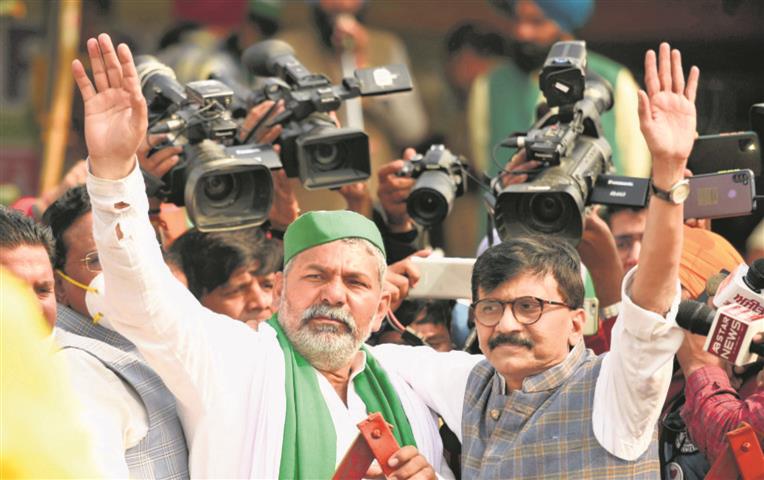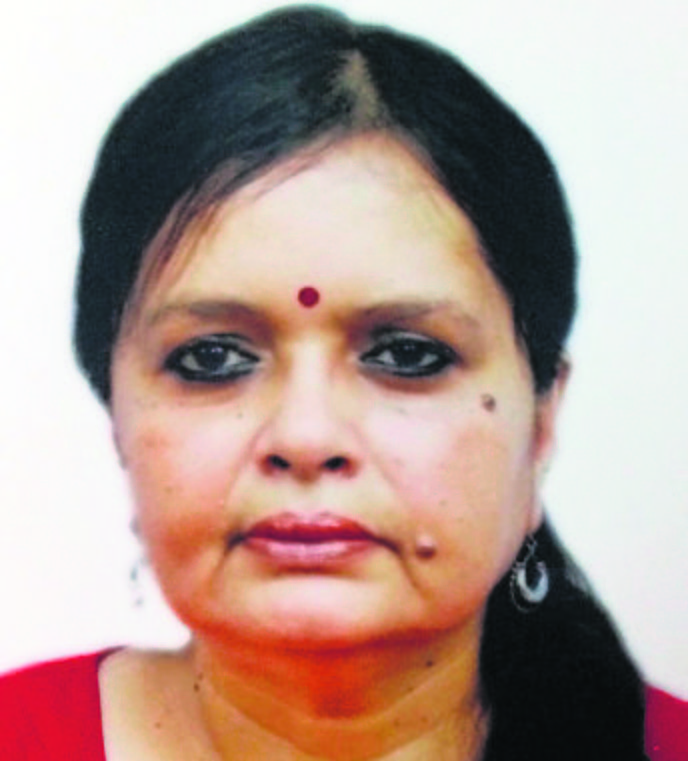
LIMITATION: Rakesh Tikait (left) possibly lacks the organisation, cadre and resources to set up the BKU as an autonomous political entity. PTI
Senior Journalist
OVER two months after the farmers’ protests began at Delhi’s borders, the incipient signs of a more direct engagement between the political Opposition and the agitators are showing up. The Opposition stepped out of the breathless and bizarre microcosm of Facebook and Twitter to set its foot on terra firma, and check out the travails of people who braved the cold and rain and are living without water and electricity. The Opposition’s forays into ground zero might not yield anything tangible. It is unlikely to pressure the Centre to resume a dialogue with the farmers, considering that the government refused to accede to the Opposition’s demand for a separate discussion on the issue in the ongoing Parliament session. But the initiative opens up the prospect of a partnership between a civil society movement and political parties to address the issues at the heart of the churn in Punjab, Haryana and west Uttar Pradesh.
On Thursday, the leaders of 10 parties (excluding the Congress and the Left Front) journeyed to UP’s Ghazipur border, shepherded by Shiromani Akali Dal (SAD) MP Harsimrat Kaur Badal. The cops did not allow them to cross the heavily fortified red line following which they returned without meeting the protesters, led by Bharatiya Kisan Union (BKU) leader Rakesh Tikait. At least, the MPs got a sense of how the Centre had recalibrated its approach to the farmers after the Republic Day violence. The same day, Priyanka Gandhi Vadra, the Congress general secretary, travelled to Rampur to meet the family of Navreet Singh, who died in a clash between the cops and protesters on January 26.
The Opposition’s endeavour is conspicuous by a lack of cohesion although the parties are pursuing the same end. The Congress couldn’t associate with the SAD because both are battling to retain or usurp a common turf, a battle that’s often marked by violence. The Dravida Munnetra Kazhagam (DMK), a Congress ally in Tamil Nadu, and the Nationalist Congress Party (NCP), which runs the government with the Congress and the Shiv Sena in Maharashtra, were part of Harsimrat’s enterprise. Leaders of the Sena, constantly looking to steal a moment on their own, went separately to Ghazipur earlier in the week. UP’s Samajwadi Party (SP), Bahujan Samaj Party (BSP) and the Rashtriya Lok Dal (RLD), who will count more than the others in the state’s political schema, were out of Thursday’s frame. The RLD, the traditional Jat party of west UP by virtue of inheriting Chaudhary Charan Singh’s formidable legacy, is forced to append itself to Tikait and stay afloat because Tikait has appropriated the RLD’s agrarian base for the moment. Tikait possibly lacks the organisation, cadre and resources to set up the BKU as an autonomous political entity. He will be pushed to work out an arrangement with one of the principal players before the next UP elections, due in 2022. That, however, depends on his ability and power to sustain the protests over a long period and withstand the use of state force.
Whatever traction the protests gained after the disaster on Republic Day that nearly derailed the movement is owed largely to the global attention they drew from a range of celebrities and the firestorm the superstars stirred on social media, making it untenable for the Centre to ignore the unexpected backlash. The Opposition’s interventions were largely confined to Parliament.
The absence of synergy between the civil society movement and the political parties does not augur well for both. If indeed the parties wish to draw political mileage from the farmers’ fight—as they certainly would in the Punjab and UP elections—can they even claim to be indirect stakeholders after remaining distant and proffering token protests? The India Against Corruption campaign rattled the United Progressive Alliance (UPA) regime with its focused and well-synchronised attack against the UPA’s alleged malfeasance. It did not reach out to the Opposition although the BJP and the RSS tried hard to get a foothold. The campaign birthed the Aam Aadmi Party but eventually the BJP gained by the atmospherics it aroused and the anti-UPA discourse it shaped. The BJP’s PM face, Narendra Modi, arrived on the scene, carrying a clean slate on the corruption quotient from Gujarat. Can the Congress likewise take advantage from the ‘kisan andolan’ or the SP and the BSP for that matter? None of them seems positioned to reap even a small harvest right now because the BJP has polarised the issue along the ‘national-anti-national’ divide and labelled the protesters and their supporters as ‘enemies of the state’. It’s a trap that the Opposition will be wary of falling into. The global celebration of the movement and backing for the farmers fuelled the BJP’s narrative of ‘foreign forces’ working to ‘destabilise’ the Modi government and by extension, India, through sections of the protesters, making justified condemnation of rights’ violations possible at the risk of being labelled a deshdrohi.
In the eighties, journalist, author and politician Arun Shourie was asked to list individuals from outside mainline politics who he thought would redefine India’s history in the coming decades. Among those he chose were Ela Bhatt, the founder of the Self-Employed Women’s Association of India and a cooperative organiser, environmentalist Chandi Prasad Bhatt who set up the Dasholi Gram Swarajya Sangh that mothered the Chipko crusade, Arun Bhatia, a former bureaucrat who floated the People’s Guardian Party, and Chhattisgarh’s path-breaking trade unionist Shankar Guha Niyogi.
Each of them was identified with value-based politics and pioneered campaigns that left an imprint on their core areas but are footnotes on a broadsheet. Barring Bhatia, who fought and lost an election in 2004, none of them joined politics and were out of the popular mainstream. Any seminal idea and movement that captures the national imagination needs a political party or allies to stay relevant and go forward.
Join Whatsapp Channel of The Tribune for latest updates.




























